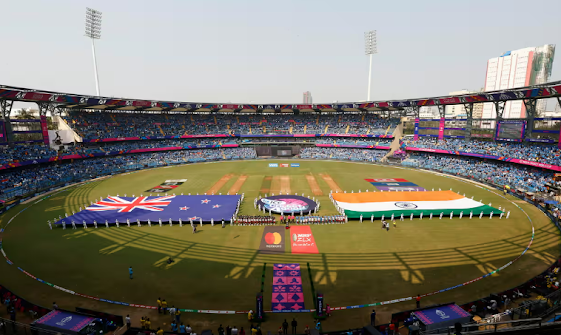The thrilling arena of cricket, where battles are fought not just with bat and ball but also with strategy and skill, a recent controversy has stirred the cricketing world. The spotlight is on India, the host nation, and its alleged interference in the pitch selection for the semi-final clash against New Zealand at Mumbai's iconic Wankhede Stadium.
The International Cricket Council (ICC), the governing body of world cricket, traditionally holds the reins when it comes to pitch selection during tournaments. The principle is clear: pitches should provide a neutral ground, ensuring a fair contest that neither favors the host nation nor undermines the excitement for the global audience.
However, the plot thickened when reports surfaced, first published in the Daily Mail, suggesting that India's Board of Control for Cricket in India (BCCI) might have pulled some strings behind the scenes. The agreed-upon plan was for a fresh pitch, promoting even bounce and pace, creating a de facto neutral surface. Yet, whispers in the cricketing corridors hinted at a last-minute switch to pitch six, previously used in matches between England-South Africa and India-Sri Lanka.
This switch, as some speculate, played right into India's hands. Known for their prowess in slow bowling, the altered pitch seemed to give them a tactical advantage. In the end, India triumphed, posting a formidable 397 for four, and securing a spot in the World Cup final.
The controversy doesn't end with the pitch switch. Reports from the Indian Express suggest that India's team management also requested the removal of all remaining grass on the pitch's eve, a move that typically slows down the game. A member of the Mumbai Cricket Association staff confirmed receiving instructions to prepare a slow track, stating, "It won't be a turner, but the team had asked for a slow pitch."
ICC pitch consultant Andy Atkinson seemed to be caught off guard, unaware of the switch and any requests made. His email, quoted in the Mail, raises questions about the sanctity of the pitch selection process for the upcoming final. Will it be a pitch tailored to the stipulations of the home team, or will it uphold the principles of fair play?
In the midst of these allegations, the BCCI maintains its stance, asserting that the ICC's independent pitch consultant collaborates with the host and venues throughout the event. The World Cup, already labeled as a home-centric affair, faces scrutiny for deviating from the spirit of open competition.
As debates rage on, fans argue that India's stellar performance, winning all ten games, is a testament to their prowess, regardless of the pitch. India's pace attack has proven formidable, challenging the notion that the team relies solely on spin. Yet, concerns loom over a potential repeat of the pitch controversy in the final at Ahmedabad, a significant venue in the home state of Prime Minister Narendra Modi.
Cricket, a sport celebrated for its unpredictability and fair play, finds itself entangled in a web of pitch politics. As the World Cup unfolds, the eyes of cricket enthusiasts remain fixed on the pitch, not just for the battles between bat and ball but also for the subtle maneuvers behind the scenes that shape the destiny of nations on the cricketing stage.






0 Comments